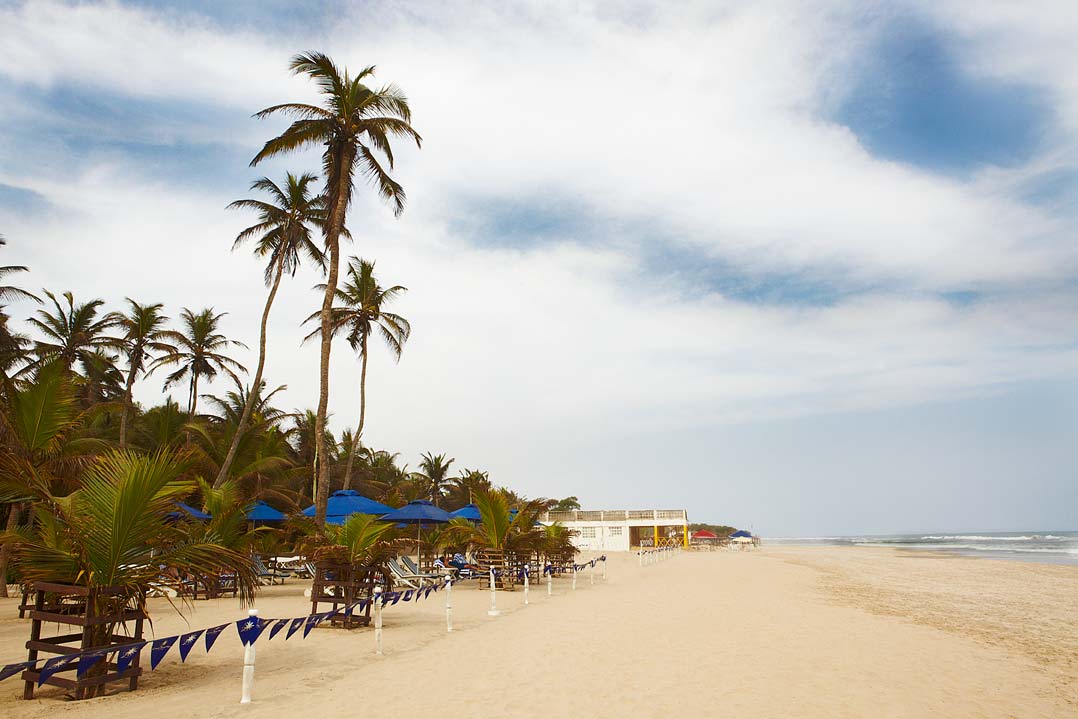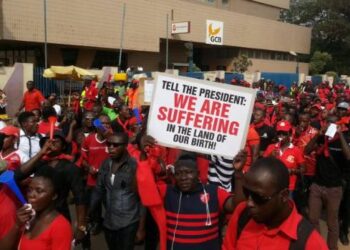A hitherto serene ambience with utmost quiescence – the beaches have become places of unrestrained joy and the normally loud Titanic Beach in the sprawling Sakumono community lived up to its feature on Ghana’s independence – 6th March 2020.
It became a beehive with its seams stretched to limits as revellers in their bikinis and pairs of shorts lit up in anticipation for a fun-filled celebration and a riot of colour to rival the accustomed weekend beach revelry.
Many had their eyes fastened upon the forming waves while it swept towards them. As the waves came, they rose for it and all the while acting like horses making at a fence outrageously high. Others watched the fun indifferently from afar with eyes filled with misted askance look.
Less than 100 meters away from the sandy beach is the “Calabash Pub” with a long stretch of other pubs successively lined up all the way to “Mighty Beach”. On the day of Ghana’s independence, apparently the last time such crowds were spotted before Covid-19 struck, music filled the air and lifted spirits, making revellers move effortlessly, jump freely and sang glamorously.
Time and time again, the music floated on the warm breeze, raining down great “hip life” and “Afrobeat” offerings – the heartbeats of the jubilant revellers.
The air tasted seemingly heavenly with the Khebab sellers lined up to dish out every delicious grilled tasty beef, chicken and some guinea fowl ready to be shared with friends and family alike. It was such a moment to behold.
Even more striking was how food vendors weaved through the mass of onlookers as the aroma of their wares perfumed the air; it was debauchery galore. But for a lot of the community dwellers, it was a time to celebrate being alive, celebrate the wonders of creation, fraternize and relive Ghana’s independence.
Although beaches have been closed temporarily, some nonconformist still defy the oars to go and have some introspection while enjoying the poignant salty breeze the beach offers – which for Abigail Asaa, a regular patron, “provides utmost serenity and peace of mind.”
COVID-19 vagaries
The typically filled Titanic beach and other beaches across the country have become deserted for nearly eight months as part of strict measures by government to stop the spread of the virus. Even though there was some easing of restrictions, beaches across the country remained closed. The pandemic has literally crushed the tourism industry, curtailing revellers and visitors who usually thronged the sandy outlines on holidays and weekends.
Indeed the tourism sector has been the worse and hardest-hit by the outbreak of Covid-19 and has brought global tourism to a standstill and affected major economic sectors immensely, albeit the situation is steadily picking up and it might be rather early to estimate the full impact of the virus on international tourism.
However, the World Tourism Organisation (UNWTO), in spite of the rapidly evolving situation, estimates in 2020 global international tourist arrivals could decline between 20-30 per cent, down from an estimated growth of three to four per cent in early January 2020.
This, the UNWTO indication translates into a loss of US$ 30 to 50 billion in spending by international visitors. But it underscores that any estimate ought to be treated with caution due to the volatile and uncertain evolution of the outbreak which could lead to further revision.
A recent study from the African Union estimates that the tourism and travel sector in Africa could lose at least $50 billion due to the pandemic outbreak and at least two million direct and indirect jobs, with devastating effects for tourism spots like Seychelles, Cape Verde, Mauritius and The Gambia will shrink at least seven per cent.
The Ghana situation
The tourism sector has experienced a rapid and sharp drop in demand and a surge in job losses globally and Ghana is of no exception as the first set of preventive restrictions announced by government had direct bearing on the sector.
Tourism, a major pillar of the Ghanaian economy, providing for over 275,023 direct and 388,000 indirect jobs in 2019, recorded 1.13 million arrivals and contributed some 3.3 billion United States Dollars in foreign exchange–an increase of 27.9 per cent over the previous year.
The sector posted a growth of 18 per cent instead of the global rate of growth of five per cent with an increase in the registration of tourism enterprises by 29.7 per cent.
According to the Ghana Tourism Authority, its expectations were to leverage on the 2019 performance to further boost the sector when Covid-19 struck, affecting a substantial part of the tourism value chain.
According to the Ghana Statistical Service Integrated Business Establishment Survey (IBES) published in June 2020, the sector operates with huge operating costs, including materials supply, goods purchased for resale, fuel, electricity, water and other operating costs accounting for 49.4 per cent in hotels and 50.6 per cent in the food beverage and entertainment sector.
“The Covid-19 pandemic has evidently affected the tourism sector tremendously and even though not much has been accomplished this year, there is work to be done collectively in harnessing our strength to promote tourism and make it greater again,” Mr Charles Buabin, Regional Director, Ghana Tourism Authority (GTA), said in an interview with the Ghana News Agency(GNA) in Tema.
He said “when boarders and the airports were closed, the tourism sector was hardest hit as it affected the whole tourism and hospitality value chain; transport was hit by the lockdown, events and conferences were curtailed with restriction in movement, reductions in congregations, restaurants couldn’t service their clients, many workers were laid off their already less-paying jobs and salaries of existing ones plummeted sharply.
“Hotels reported extremely low occupancy rates, Tour Operators reduced or halted their operations, event organizers faced huge financial losses due to reduction in in-person events, the entertainment industry has also been immensely affected.”
According to Ghana Tourism Federation (GHATOF), 80 per cent of the informal sector have shut down and restaurants were expecting a drop in patronage by up to 50 per cent, whiles Tour Operators Association estimated that 11,558 expected tourists had to cancel their vacation, leading to a revenue loss of GHS 4,847,402.41 as there had been the indefinite postponement of productions, posting an estimated loss of GHS 688,000.
Domestic Tourism amidst Covid-19
As efforts are being made by stakeholders to enhance tourism and make Ghana the preferred tourist destination, it is also imperative to focus attention on scaling up the numbers in the domestic tourism sector.
This requires a shared responsibility and concerted effort by all stakeholders including; traditional authorities, individuals, and government agencies with a stake in providing service, direction, and sector policy to enhance domestic tourism and attract tourists to the country.
Brigadier General Jo-Sylvester Kwame Nkrumah, Director of Task Force, Tema Development Authority (TDC) Limited, who chaired a committee to assess conditions at the Sakumono Titanic Beach to develop it into a world class tourist centre, told the GNA that there needed to be a national psyche that upholds local tourism.
“If opportunities could be better enhanced for ordinary Ghanaians to engage in domestic tourism at a competitive cost, then there wouldn’t be a situation in which only top income earners enjoy the hospitality industry at high cost whiles a substantial number are consigned to boring and never-changing life styles,” he noted.
“There is need to deliberately invest in domestic tourism particularly in the area of infrastructure, development of tourist sites, improvement on transportation and communication facilities, provision of good appropriate training for escorts, guides, and managers” he added, and reiterated the closer collaboration among Ministries and Agencies, hotels and other entities that had a stake in the industry or were potential partners.
With the impact of the Covid-19 being felt throughout the entire tourism ecosystem, reopening and rebuilding destinations require a collaborative approach, and in response to the immediate and widespread effects on the sector, government’s GHS 1 billion channeled through the National Board for Small Scale Industries (NBSSI) and a stimulus package of GHS 3 million loan from Commercial Banks to provide financial relief for businesses, is a very commendable.
Domestic tourism is one of the sectors of the economy which puts direct income into the hands of those engaged in it but the pandemic has had a very tangible impact in the sector which now requires a stronger, more sustainable and resilient strategy to revitalize it.
In this regard, there’s need for a recovery plan which restores confidence, stimulates demand for the tourism sector, rebuilds destinations and encourage innovation and investment to boost domestic tourism as Covid-19 restrictions are gradually being lifted.
Way to go
It is an axiomatic fact that the tourism sector has been heavily impacted by the pandemic. Tourism sites including beaches were temporally shut down as part of measures by government to contain the spread of the virus.
But while there is delay and continued uncertainty in the re-opening of beaches, pubs and cinemas, Mr Frank Kojo Tsegah, a resident of Sakumono, who frequented the Titanic Beach and occasionally, the Labadi and Laboma Beaches before its closure, reckons “before the beaches are re-opened, there should be greater emphasis on safety and an improved health screening and hygiene measures in order to restore confidence.”
Of course, Ghana’s remarkable and beautiful tourist attractions, hospitable citizens and coupled a great food culture, provides an impetus to the improvement of the tourism sector which is fast becoming one of the primary supports of the Ghanaian economy.
With the inter-relatedness and dependence of the tourism industry which has lots of interlinked sectors along the tourism chain, there is need for a coordinated effort to get businesses up and running again as Covid-19 restrictions are gradually being lifted.
The constitution of a taskforce to monitor the impact of the pandemic on tourism with swift response to the fast evolving situation is key. This should aim at determining which sub-sectors in tourism are in utmost distress, and where immediate assistance is required, a well-developed recovery support is given.
Ultimately, while the medium and long-term tourism impacts of Covid-19 differ between countries, destinations and segments of the tourism sector, it is evident that in order to fully open up while the virus is still circulating, government ought to take a measured and coordinated policy action at the local, national and international level protect people while minimizing job losses and business closures in the medium and long term.









Discussion about this post